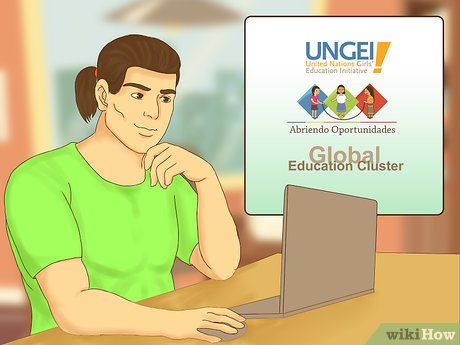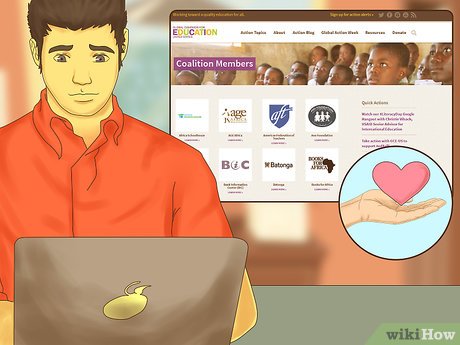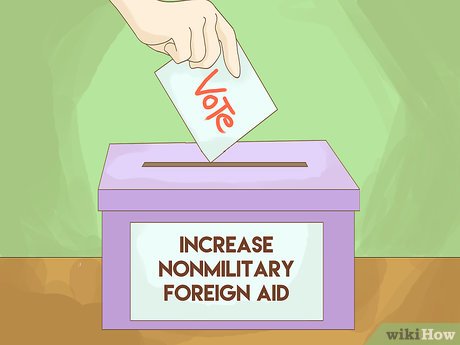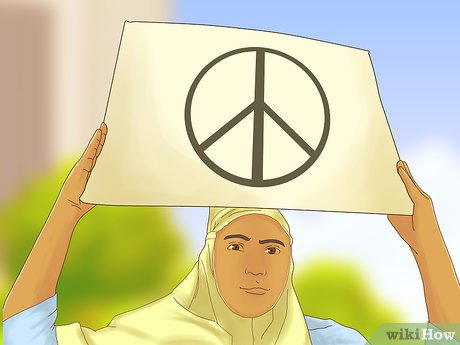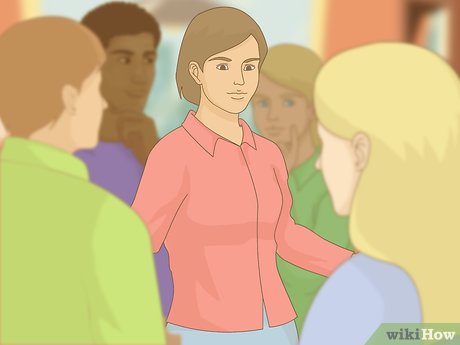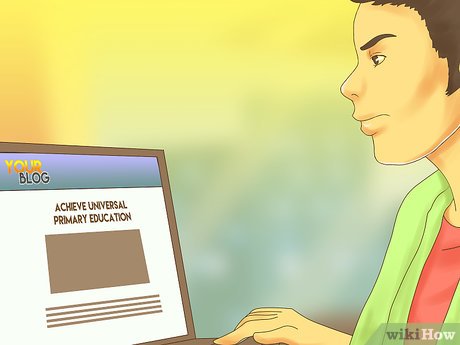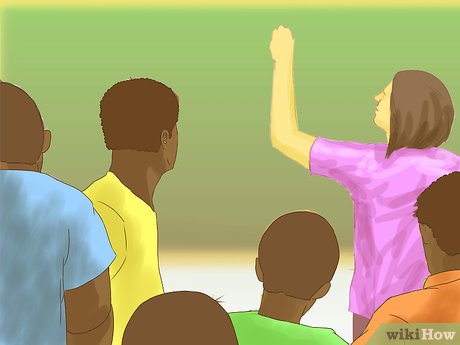How to Help Achieve Universal Primary Education
Method 1 of 3:
Supporting Programs That Advance Universal Primary Education
-
 Research programs and agencies. There are a multitude of UN, governmental, and intergovernmental programs actively working toward universal primary education. You'll be better prepared to support programs advancing the goal when know which agencies are most active in the field. Some of the major organizations are:[1]
Research programs and agencies. There are a multitude of UN, governmental, and intergovernmental programs actively working toward universal primary education. You'll be better prepared to support programs advancing the goal when know which agencies are most active in the field. Some of the major organizations are:[1]- The United Nations Girls' Education Initiative (UNGEI) is a UN agency focusing on education among women, because women and girls around the world are far more likely to be unschooled than men and boys. UNGEI partners with agencies in individual countries, offering technical support in the design and funding of schools.[2]
- Abriendo Oportunidades (Opening Opportunities) is another UN initiative, this time based in Guatemala, which focuses on the education and mentoring of school-age girls.[3]
- The Global Education Cluster is the premier UN agency addressing the difficulties associated with providing education to those in conflict zones. It aims to make the provision of educational resources a standard practice in the dispensation of humanitarian aid (it isn't now).[4]
-
 Donate. If you've found some private agencies that share your vision, the most straightforward way to help them is by giving a donation. Your donation can be monetary or in-kind.[5]
Donate. If you've found some private agencies that share your vision, the most straightforward way to help them is by giving a donation. Your donation can be monetary or in-kind.[5]- There are dozens, if not hundreds, of private nonprofit groups active in assisting education in developing areas. You can see a partial listing of highly regarded nonprofits at http://campaignforeducationusa.org/members.
-
 Vote to increase nonmilitary foreign aid. The UN has no independent authority to tax individuals. Contributions to goals set by the UN are determined by individual countries and disbursed through the UN. When you hear the term 'foreign aid,' it's a blanket term describing all types of aid, including aid to help advance the Millennium Development Goals.[6]
Vote to increase nonmilitary foreign aid. The UN has no independent authority to tax individuals. Contributions to goals set by the UN are determined by individual countries and disbursed through the UN. When you hear the term 'foreign aid,' it's a blanket term describing all types of aid, including aid to help advance the Millennium Development Goals.[6]- While you can't pick exactly where foreign aid will go, most nonmilitary foreign aid will at least help advance educational goals indirectly. For example, malnutrition, poverty, and disease are big reasons why any particular child isn't attending elementary school.
-
 Support efforts at reducing military conflict. While more children overall are in primary school compared to fifteen years ago, the opposite is true when it comes to children in conflict zones. In conflict zones, the proportion of children out of school has increased to 36% from 30%, a discrepancy high enough to indicate a relationship between the types of wars fought today and the disruption in educational services.[7]
Support efforts at reducing military conflict. While more children overall are in primary school compared to fifteen years ago, the opposite is true when it comes to children in conflict zones. In conflict zones, the proportion of children out of school has increased to 36% from 30%, a discrepancy high enough to indicate a relationship between the types of wars fought today and the disruption in educational services.[7]- Therefore, it should be clear that 'military solutions' to global problems are not solutions to problems of school enrollment, whatever their other merits may be.
Method 2 of 3:
Becoming an Effective Advocate
-
 Spread the word amongst friends and associates. Talking to your friends, colleagues, and family about barriers to universal worldwide enrollment can prepare you for more serious advocacy. Explain to the people in your circle the importance of primary education and just how close the international community is to solving the problem. Even if they don't care about the issue as much as you do, they should walk away from the encounter understanding why it's important, yet solvable, problem. As always, tailor your appeal to the individual. Think about their experiences and sympathies so your pitch sinks in.
Spread the word amongst friends and associates. Talking to your friends, colleagues, and family about barriers to universal worldwide enrollment can prepare you for more serious advocacy. Explain to the people in your circle the importance of primary education and just how close the international community is to solving the problem. Even if they don't care about the issue as much as you do, they should walk away from the encounter understanding why it's important, yet solvable, problem. As always, tailor your appeal to the individual. Think about their experiences and sympathies so your pitch sinks in.- For example, imagine your friend is a person who prides themselves on being 'self made.' Even though you care about universal primary education in a way they don't, you can make them care about the issue.Talk to your friend about the ripple effect a nonexistent elementary education has on a person's life. You could open by saying something like this: 'You've managed to go out and achieve a lot, which is pretty exceptional. But can you imagine how hard it would have been if you didn't know multiplication tables, the scientific method, or how to read? Would you have been able to achieve what you've managed to achieve if you hadn't?'
- It's easier to influence a new opinion than change their mind. Try to talk about unfamiliar subjects or by approaching new subjects in unfamiliar ways.
-
 Take advantage of social media. Twitter, Instagram, Facebook, and other social media platforms are a cheap way to raise awareness of any type of issue. You can reach large audiences with comparatively little effort. Plus, there's always the possibility of an issue going viral (remember KONY 2012?).[8] Use social media to promote articles, videos, and memes that tackle issues relating to problems caused by inadequate primary education and initiatives designed to stop it.
Take advantage of social media. Twitter, Instagram, Facebook, and other social media platforms are a cheap way to raise awareness of any type of issue. You can reach large audiences with comparatively little effort. Plus, there's always the possibility of an issue going viral (remember KONY 2012?).[8] Use social media to promote articles, videos, and memes that tackle issues relating to problems caused by inadequate primary education and initiatives designed to stop it.- Sometimes the reach of social media is larger than its impact (remember KONY 2012?). Even though it's a low cost way to broadcast a message, social media by itself doesn't create change. In fact, relying too much on social media can turn your activists into 'slacktivists,' or people who are constantly hitting the 'share' button to spread a message, but do nothing else.[9]
-
 Transform your opinions into media. You can take your advocacy one step further by creating content centered around achieving universal primary education. 'Content creation' just means creating any type of media—like hosting or contributing to podcasts, blogs, and vlogs. [10]
Transform your opinions into media. You can take your advocacy one step further by creating content centered around achieving universal primary education. 'Content creation' just means creating any type of media—like hosting or contributing to podcasts, blogs, and vlogs. [10]- While creating your own blog, podcast, or YouTube channel is more work, if you want complete control over messaging, it's the only way to go. See Start Your Own Podcast and Start a Blog to learn more.
-
 Join a preexisting group. By joining a group that's already established, the message is amplified in accordance with the strength of the group. Even though you sacrifice control over the message, the group helps give you credibility and access you wouldn't ordinarily have. In addition to the aid agencies and programs outlined in the first section, there are several private entities devoted to addressing this issue, such as the Jesuit Refugee Service, Books for Africa, RESULTS, School Girls Unite, and the United Methodist Board of Church and Society.[11]
Join a preexisting group. By joining a group that's already established, the message is amplified in accordance with the strength of the group. Even though you sacrifice control over the message, the group helps give you credibility and access you wouldn't ordinarily have. In addition to the aid agencies and programs outlined in the first section, there are several private entities devoted to addressing this issue, such as the Jesuit Refugee Service, Books for Africa, RESULTS, School Girls Unite, and the United Methodist Board of Church and Society.[11]- Saying, 'I advocate with a group called RESULTS, which addresses global poverty and educational resources. I'd like you to know a few things we do,' has a much better ring to it than 'You know what I think?'
-
 Reach out to people in power. Take your message to people who have the power to make the changes you want to make. With an international effort to address primary education, there are many different decision makers and many ways to communicate with them. For example:
Reach out to people in power. Take your message to people who have the power to make the changes you want to make. With an international effort to address primary education, there are many different decision makers and many ways to communicate with them. For example:- You can write a letter to the editor of your local newspaper, your congressman, senator, mayor, or other political figure. Let them know how close the UN member states are to achieving the goal of universal primary education, and how increased foreign aid could make a serious dent in the problem. Advocate in support of diplomatic efforts to broker peace treaties, or simply highlight the efforts of a group you belong to.[12]
- Start an online petition and publish it on social media. If you don't think you own voice is enough, amplify it. Sometimes change isn't possible until elected officials understand how many people care about an issue. [13]
- If you gather enough signatures, printing out a hard copy can be a very dramatic gesture. The big stack of papers is more visually impressive than a PDF with a few thousand signatures.
Method 3 of 3:
Working in the Field
-
 Be a voluntourist. 'Voluntourism' means planning a tourist experience around volunteer activity, and it is a growing sector of international travel. Instead of your vacation revolving around pleasure activities, it centers on service activities.[14]
Be a voluntourist. 'Voluntourism' means planning a tourist experience around volunteer activity, and it is a growing sector of international travel. Instead of your vacation revolving around pleasure activities, it centers on service activities.[14]- While voluntourism is well intentioned, it isn't a cure all for the world's problems. If it puts a native worker out of a job, it can even cause more problems than it solves. Make sure you have a skill that can truly be beneficial to the people in your host country (they are likely to have all the unskilled labor they need).
- Learn more about the thousands of voluntourism opportunities at http://www.voluntourism.org/traveler-start.html.
-
 Become a teacher overseas. There's no education without teachers, so teaching elementary school in a developing country is the most hands-on way to aid universal primary education as a goal. There are a few ways to go about this:
Become a teacher overseas. There's no education without teachers, so teaching elementary school in a developing country is the most hands-on way to aid universal primary education as a goal. There are a few ways to go about this:- Most teachers overseas are English teachers, and most English teachers are certified to Teach English as a Foreign Language (TEFL). There is no one accrediting body for TEFL certification, and there are hundreds of programs offering certification both online and at university campuses. Those applying to a course typically do need a bachelor's degree, however. [15]
- If you want to teach another subject area, you can look at job vacancies in the locale where you want to go, or browse the International Educator's online job board. You can find the list at http://www.tieonline.com/.
-
 Work for a nonprofit that works in a conflict zone. Since the fastest-growing population of unschooled children are in conflict zones, an area where a person can have the greatest impact is in a conflict zone. There are many highly regarded non-profits at work in conflict zones, including Mercy Corps, International Rescue Committee, International IDEA, Peace Brigades International, and Peace Direct.[16]
Work for a nonprofit that works in a conflict zone. Since the fastest-growing population of unschooled children are in conflict zones, an area where a person can have the greatest impact is in a conflict zone. There are many highly regarded non-profits at work in conflict zones, including Mercy Corps, International Rescue Committee, International IDEA, Peace Brigades International, and Peace Direct.[16]- Of course, each job will have its own specific qualifications, but many jobs for overseas nonprofits look for persons with Master's Degrees, foreign language skills, and experience working or living abroad.
Share by
Marvin Fry
Update 24 March 2020
